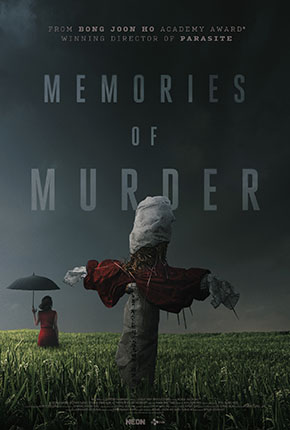
MEMORIES OF MURDER tells the harrowing true story of the hunt for a sadistic serial rapist and murderer terrorizing a small province in 1980s South Korea. Marking the first of many successful collaborations between four-time Oscar winner Bong Joon Ho and leading man Song Kang Ho, the film follows the paths of three increasingly desperate detectives as they attempt to decipher the violent mind of a killer in a futile effort to solve the case. Now, seventeen years after its initial release, and a year after the real culprit was identified, this cult classic takes its place as a modern masterpiece.
Asian Movie Review: Memories of Murder
After my disappointment after watching Killer Toon, I quickly needed a quick pick-me-up rebound film from South Korea. The DVD of Memories of Murder, directed by Bong Joon Ho, who won an Oscar for Parasite, stared back at me from its place atop of my media shelf, and so, I accepted its call and dropped it into the DVD tray. With a runtime of just over two hours, which seems to be average among South Korean movies, I prepared myself for a lengthy date with S. Korean goodness.
Memories of Murder was inspired by the real-life series of murders and rapes that plagued Hwaseong, a city about thirty miles south of Seoul. In the late 1980s and early 90s. The murders have been compared to that of the Zodiac killer here in the states. In Memories of Murder, we are introduced to two seemingly incompetent detectives hell-bent on pinning the murders on some poor and mentally disabled young man. The tactics used to coerce a confession include, but not limited to, physical and verbal abuse, planting evidence, trickery, and deception, among others. As I watched, I hoped that director Bong Joon Ho took liberties with his portrayal of the police. When Detective Cho Yong-Koo from Seoul offers to lend a hand, his suave and calm demeanor paled in comparison to detectives Doo-Man and Taeyoon, whose “signature” interrogation “tactic” was kicking and beating suspects into submission. I was somewhat taken aback as I watched as some of the scenes were downright laughable and even pitiful in depicting the police. Was there a reason why the police were being poked fun at, or did the detectives in charge of the real-life investigation screw the pooch massively?

A quick Google search led me to this 2015 article titled Portraying Police in Korean Cinema that shed some light on what I saw in Memories of Murder. In the article, the author states, “In many significant cinematic works, Korean cops are often linked with corruption, injustice, incompetence and even violation of human rights.” This helped to put things into context.
The film opens with a group of rag-tag kids as they trail Detective Doo-Man. The detective, unbeknownst to the audience, is on his way to a crime scene. There, a young woman is discovered in a ditch. The scene goes from a seemingly light-hearted moment to one of dread as we see the dead woman and how the killer discarded her. The moment is then followed by Detective Doo-Man trying to secure the crime scene (which consists of the detective comically shooing the children away), a feat that already should have been completed.

Being that the real killer was not yet caught, there was little to go on, which left the audience just as dumbfounded as the detectives. Again, there are parallels with the Zodiak case in San Francisco, where the killer’s identity remains to be determined and the case unsolved. There were a few nods to the FBI, and the impression that I gathered was there was perhaps no such branch of the South Korean government that may have helped in the investigation. What’s more, is that forensic technology was still primitive in the country, and even analyzing a sample of DNA had to be sent to the United States. Again, this is information gathered while watching the film.

The murders aside, there was not a whole lot of shock nor emotional value to Memories of Murder, at least not at the level that I expected. However, Memories of Murder is still an exceptional film by director Bong Joon-Ho; I just anticipated more and something different. If you have read any of my other South Korean movie reviews, you would be familiar with the genre-bending prevalent in many of their films. Genre-bending is the blending of different genres; one minute, you are terrified, the next you are laughing at bumbling characters, then on the verge of tears. And this usually works, but I really would have liked for Memories of Murder to play out as a straight psychological procedure as I could have done with the detectives’ ineptitude antics. To me, it was what I interpreted as unnecessary humor, whether it was intended or not. Was it meant to be portrayed as such, or was this tactic utilized to emphasize the police’s poor job in this unsolved (at the time) case? It’s entirely possible. Where I found myself in awe by the detectives’ ineptitude, the film takes a hard turn to exemplify the terror that this killer bestowed in the small city. By the end of the film, I would say that the film is a great exercise and experience in Korean cinema, and I would say that it is right up there with the likes of Insomnia. By the end, there is a feeling of malice in dread, and you come back to reality by remembering that this all happened, disturbing.
